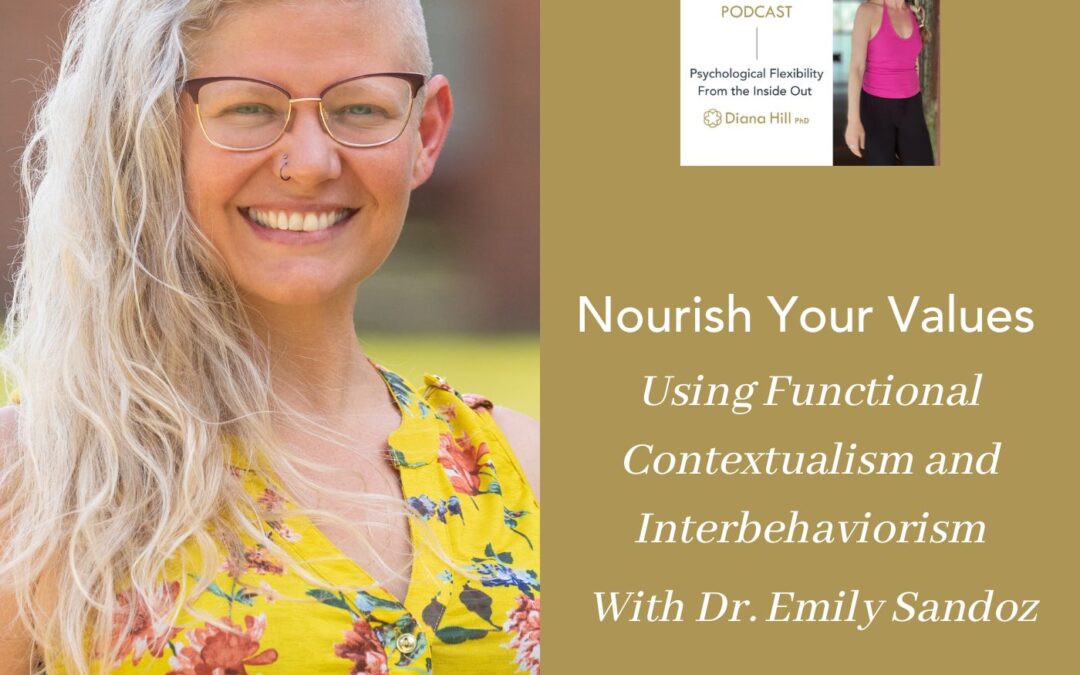Everything you do and feel occurs in a context. You are shaped by your learning history, your environment, other people, and you are continuously shaping the world around you. In this episode, Emily Sandoz shares how you can apply the ACT concepts of functional contextualism and interbehaviorism to build a juicier, richer, values-based life. Learn to resource yourself and thrive in whatever context you are in.
Listen and Learn:
- Why we do what we do
- What is functional contextualism
- The difference between behaviorism and interbehaviorism
- The overlap between Buddhism and behaviorism
- How to resource yourself
- Creating contexts that nurture
- Contacting values and joy
- Convolving with others
About Emily Sandoz
Dr. Emily K. Sandoz (she/they) is the Emma Louise LeBlanc Burguieres/BORSF Endowed Professor of Social Sciences and Full Professor in the Psychology Department at the University of Louisiana at Lafayette. Emily is the Director of the Louisiana Contextual Science Research Group, which supports collaborative contributions from students and professionals from all over the world. They have co-authored three books on acceptance and commitment therapy for struggles with eating and body image, along with chapters and journal articles on contextual behavioral science, social justice, clinical behavioral processes, and psychological flexibility. Emily has led more than 100 training workshops for professionals around the world, and serves as a peer-reviewed ACT trainer. They also practice as a Clinical Psychologist, focusing on clinical behavior analysis. Emily happily accepts both “she” and “they” pronouns as reflective of different aspects of their identity.
Related Resources
Check Out Emily Sandoz’s books:
Living With Your Body & Other Things You Hate
Research Paper: Interbehavior as a clinical focus in CBS: A response to Hayes and Fryling (2019)
Research Paper: Interbehavioral psychology and radical behaviorism: Some similarities and differences (1984)
Interbehaviorism in One Minute with the Daily BA
Missed the Wise Effort Together Gathering? You can still watch here.
Subscribe to my free Wise Effort newsletter
Become a MORE Life in Process member to support the show. ➡️
Find out what kind of Striver you are and get your free Skillful Striving Toolkit
Want to learn more about ACT? Take Diana’s on-demand course Foundations of ACT
Diana’s Events
Sign up for the Wise Effort Together Gathering
Sign up for Diana’s Reset and Restore Retreat in Costa Rica in Spring 2024!
Meditate with Diana at Yoga Soup
Learn from Diana at an upcoming event
Connect With Diana
Thank you for listening to Your Life in Process!
Subscribe to the podcast for free on Apple Podcasts, Spotify, Google Podcasts.
Follow Diana on YouTube, Instagram, LinkedIn, Facebook, and Diana’s weerview.bsite.
Leave feedback for the show or a voicemail at (805) 457-2776
Thank you to the team Craig and Ashley Hiatt. Thank you to Benjamin Gould of Bell & Branch for your beautiful music.
Remember when you become psychologically flexible, you become free.


